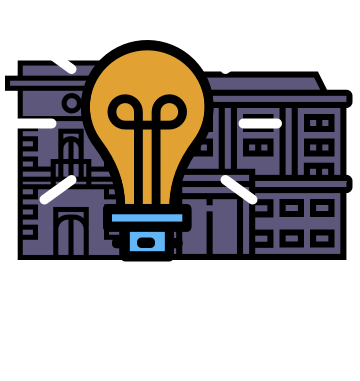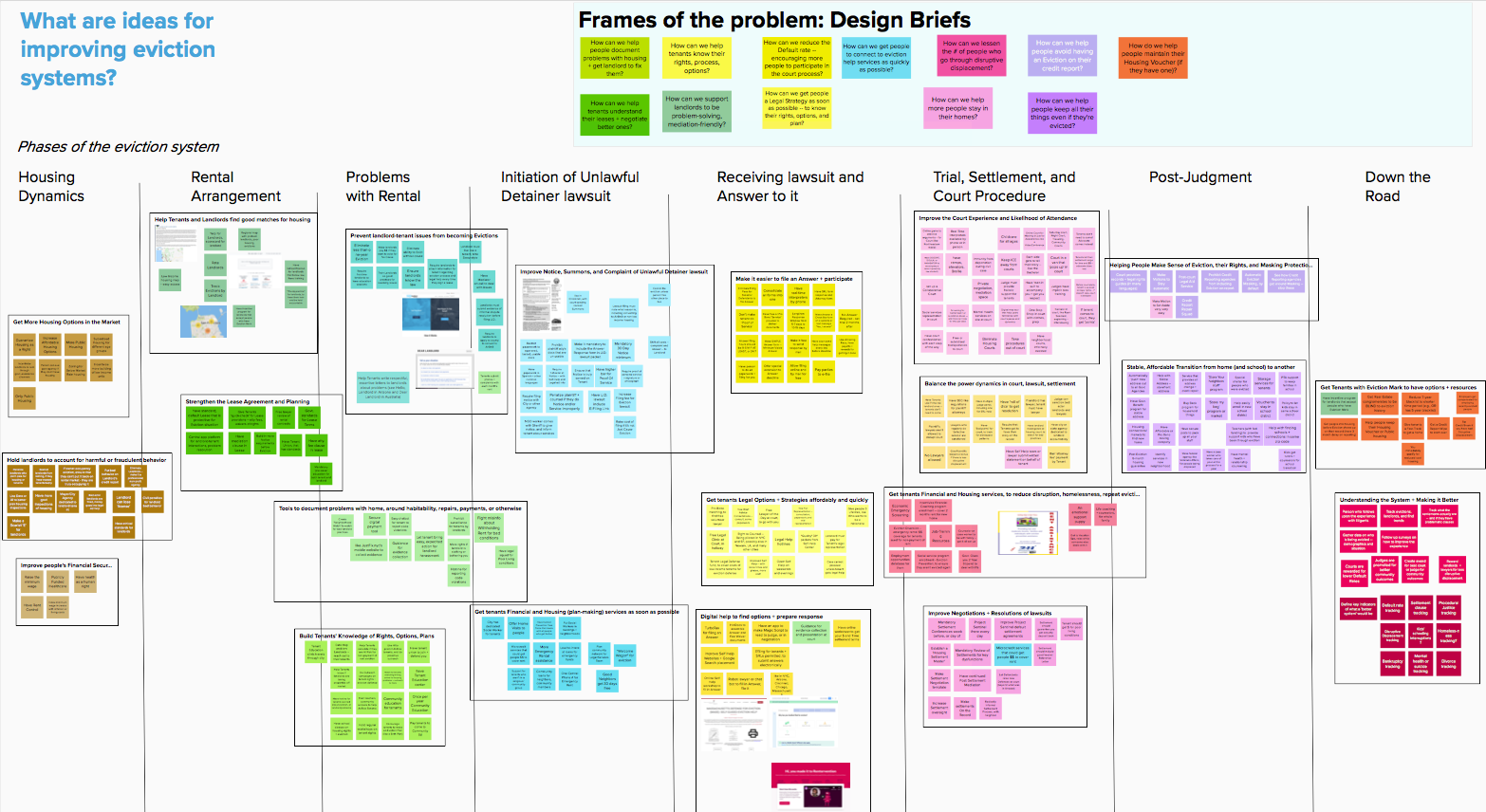What are the policies, services, and technology interventions that can prevent individual evictions & slow the American eviction crisis?
This page provides an overview of these things that can get to better outcomes, like how to:
- reduce eviction filings,
- improve tenants’ rates at appearing in court,
- increase housing stability,
- reduce disruptive displacement, and
- improve the ability of tenants and landlords to reach mutually acceptable agreements at resolving evictions.
Eviction Interventions by Type
We have individual pages describing how to prevent evictions through new services, policies, technology, and court programs. Visit these pages to go into depth with them.

Court-based innovations
What can courts, judges, and clerks be doing to mitigate evictions? How can they divert cases away from eviction orders?

Policy and Law innovations
What legislation or rules can prevent evictions, limit their harm, and promote housing stability?

Legal Service innovations
How can legal aid, pro bono, legal navigators, and legal technologies help people protect themselves during an eviction?
Eviction Diversion Programs
How can service providers work together to divert problems away from lawsuits?
Tech & Data Initiatives
Explore the websites, apps, and data initiatives that can help resolve problems & direct resources.
Eviction Interventions by Phase
We have been mapping out the interventions that are being piloted and proposed at different phases of the eviction system. We believe that policy-makers and service-providers must focus on both the long-term, systemic upstream changes to the housing market, as well as on the short-term changes to the services, rules, and policies of the eviction system itself.
Many of the academic studies and think tank proposals around addressing the eviction crisis focus on policies well upstream from the eviction process, that target the housing market and affordable housing more generally, such as changing the housing market dynamics to increase supply and tenant protections, like with rent control, a guaranteed right to housing, incentives to build ADUs (accessory dwelling units or granny-flats), or new zoning rules; increasing the availability of housing support for low-income families through increased public housing, vouchers, or increased funding assistance; or addressing people’s mismatched income-to-rent ratio, with a higher minimum wage, and more available lending and forgiving repayment options to people.
The mapping below leaves out these categories of responses that are more focused on root causes, such as efforts aimed at increasing the stock of affordable housing, and focuses on, also crucial, short-term changes.
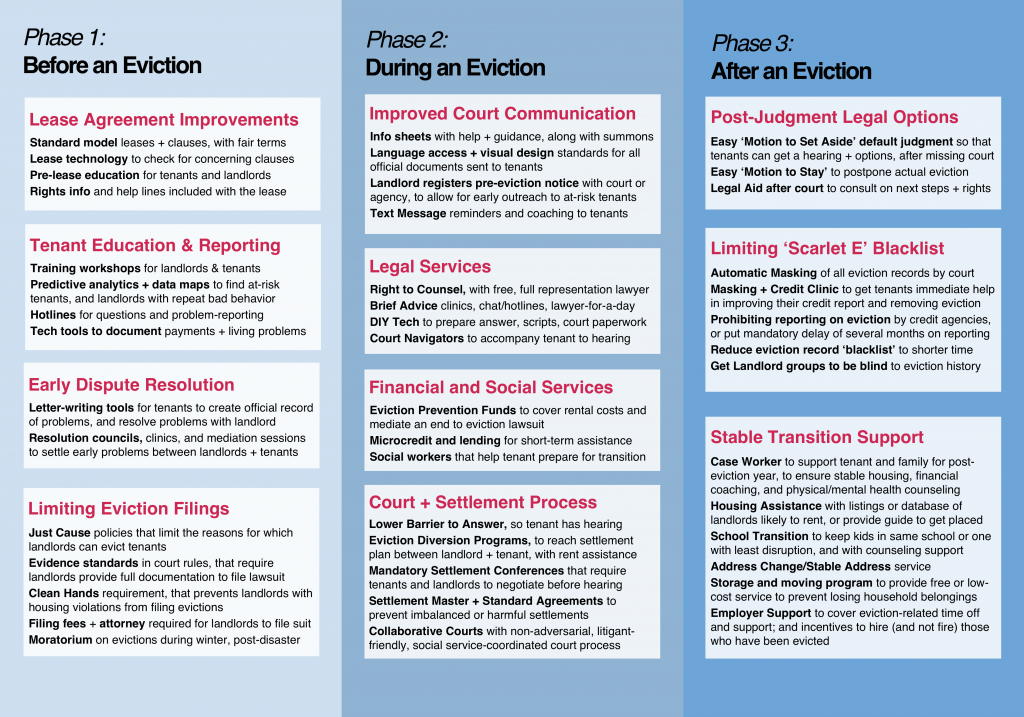
Phase 1 Solutions: Before the Eviction
Phase 1: Ideas for Before an Eviction
These innovations focus on educating tenants and landlords about their rights, improving rental agreements, and putting in place policies to reduce the likelihood an eviction is brought.
Rental Registries
Government-run registry of who landlords are, what properties they are renting, and who the renters are. This registry could be at the city, county, state, or national level. The registry can be used to do effective outreach and notification about benefits, protections, and services.
Tenant education and problem documentation
Workshops, seminars, and other outreach campaigns to educate tenants on their rights, including how to navigate court processes.
Landlord education programs to ensure they understand the law and know how best to resolve issues with tenants.
Hotlines and other resources for tenants worried about their housing conditions or a possible eviction, including tools to report code violations and tools to determine whether a tenant could be at risk of eviction.
Data-driven mappings and listings of landlords who engage in problematic behaviors, and predictive analysis of where inspectors and outreach might be focused.
Tools to document payments and living conditions, to support future legal proceedings or to be shared with other community members to identify systemic violations or support wider advocacy.
Lease improvements
Standard model leases with provisions that protect against common challenges faced by tenants, including providing for fairer procedures such as mediation.
Lease-related technology, such as tools that let tenants quickly check a lease for concerning clauses or missing terms.
Pre-lease signing education for tenants and landlords to increase awareness of key lease provisions, including dispute resolution options.
Information about rights, options, and legal helplines to be provided along with the lease.
Early dispute resolution
Letter-writing tools for tenants to communicate problems effectively to landlords.
Resolution councils and sessions to provide guidance to both landlords and tenants.
Limiting certain filings
Just cause standards that require landlords to show an acceptable cause for why they are filing for an eviction (e.g., based on a lease contract violation) or require a fee for evictions without cause.
Evidence standards that require landlords provide full documentation of notices and other documents before they can file for an eviction, or even require they provide proof that they have exhausted other mechanisms.
Clean Hands requirements preventing landlords with code violations from filing eviction actions.
Filing requirements such as higher fees or attorney involvement.
Moratorium on evictions for times when people are particularly vulnerable, including wintertime, disasters, public health emergencies or otherwise.
Phase 2 Solutions: During an Eviction
Phase 2
These innovations focus on improving tenants’ understanding of what is happening, equipping them throughout the legal process, and connecting them to other resources and supports.
Improved notices and official documents about evictions
Information sheets from the court or the landlord (and their attorney) that would accompany a notice of a possible eviction action, a summons to court, or the eviction complaint and which provide information about legal aid, financial help, and other resources.
Requirements that landlords register any notice to evict with a mayor’s office or other agency to increase awareness and tracking of informal evictions.
Visual design standards for all notices, summons, and complaints (and possibly all documents used by landlords and their attorneys) to ensure that these documents are legible, comprehensible, and actionable by tenants.
Language requirements that ensure landlords, attorneys, and courts are communicating in tenants’ preferred language.
Financial services
Microcredit and lending services that responsibly provide short-term financial assistance, including emergency rental assistance.
Social Services
Social workers and eviction prevention counselors for tenants in public housing complexes, nonprofit housing, and private housing.
Legal services
[Applicable at all stages of the process] Right to counsel policies that provide counsel to those facing evictions, often throughout all stages of the process, and either for all tenants or based on established eligibility criteria (e.g., income level or type of eviction).
Phone and chat hotlines that provide guidance to tenants about their options and the process and refer them to other resources.
One-off advice clinics or consultations, such as lawyers-for-a-day programs, that provide tenants quick access to a lawyer who can help them form a strategy or represent them in court. Lawyers can often be accessed in court, at legal aid, or elsewhere.
DIY websites and paper materials that guide tenants through how to prepare documents, paperwork, and scripts for their court process. These can be through ‘guided interviews,’ ‘document assembly programs’ and other tools that provide interactive, tailored information and can provided by courts, self-help centers, legal aid groups, foundations, or other entities.
Google and other search engine strategies that improve the likelihood that tenants will find free legal help (or other guidance) if they search online, through courts and legal aid groups investing in outreach and search engine placement or through technology companies proactively choosing to foreground public interest resources if someone is searching for help with eviction.
Court processes
Lower barriers to answer, in those states that require a tenant to answer the lawsuit in order to get a hearing (and avoid a default). Eliminate filing fees for a tenant filing an Answer. Have the court do the ‘Proof of Service’ rather than the tenant. Lengthen the Answer response time to 14 days. Make a simple Answer form that does not require expert knowledge to complete. Allow tenants to e-file their answer, rather than doing it in person at a limited time. Or, at the most basic, remove the Answer requirement and guarantee all tenants a hearing.
Language access for all forms and communications, interpreters who are available pre court and the day of the hearing.
Collaborative courts and social services at court that give litigants additional support, including access to mental health supports and social service screening and referrals. This could also entail changing the structures and formalities of the court in order to allow litigants to speak more freely, find outcomes that serve their needs, and overcome other biases.
Court watchers or navigators, who accompany a litigant through the procedure and hearing and provide some amount of explanation and guidance (though not legal advice).
Negotiation and settlement assistance
Eviction diversion programs that bring landlords and tenants together after an eviction lawsuit has been filed to agree on a settlement plan that eliminates the lawsuit and typically includes rental assistance and other measures to help tenants stay stably-housed.
Mandatory settlement conferences that bring parties together before the hearing to work out a mutually beneficial settlement and close the lawsuit, or efforts to at lease encourage settlements.
Housing settlement masters and standards for default agreements to prevent imbalanced and harmful settlements. This could entail the court or legal aid providing Settlement Negotiation Templates that guide first-time litigants through what to ask for and how to navigate settlement talks and suggest provisions such as receiving a reference letter, full return of the security deposit, and financial consideration for poor living conditions.
Phase 3 Solutions: After an Eviction
Phase 3
These innovations focus on how to mitigate the consequences of an eviction, including facilitating access to new housing, education, and employment.
Post-Judgment court and legal improvements
Easy ‘Motion to Set Aside’ default judgment that tenants can get a hearing + options, after missing court
Easy ‘Motion to Stay’ to postpone actual eviction
Legal Aid after court to consult on next steps + rights
Stable Transition Support
Case Worker to support tenant and family for post-eviction year, to ensure stable housing, financial coaching, and physical/mental health counseling
Housing Assistance with listings or database of landlords likely to rent, or provide a guide to getting placed in a home
School Transition to keep kids in the same school or one with least disruption, and with counseling support
Address Change/Stable Address service
Storage and moving program to provide free or low-cost service to prevent losing household belongings
Employer Support to cover eviction-related time off and support; and incentives to hire (and not fire) those who have been evicted
Eviction masking and credit reports
Policies that seal evictions records or limit the extent to which landlords and others (such as credit providers) can take them into account.
Automatic Masking of all eviction records by court
Post-Court Masking + Credit Clinic to get tenants immediate help in improving their credit report
Prohibiting reporting on eviction by credit agencies, or put a mandatory delay of several months on reporting
Reduce eviction record ‘blacklist’ to shorter time
Get Landlords Groups to be blind to eviction history
See the latest eviction prevention innovations
- Introduction to Civil Diversion in courts
 The National Center for State Courts has a hands-on, detailed webinar that guides courts & community partners on Civil Diversion programs. This covers eviction diversion programs, as well as similar programs for other case types (like foreclosure diversion). Here’s more from the National Center for State Courts description: A growing majority of civil cases in state courts fall under high-volume dockets such as landlord-tenant, mortgage foreclosure, and…
The National Center for State Courts has a hands-on, detailed webinar that guides courts & community partners on Civil Diversion programs. This covers eviction diversion programs, as well as similar programs for other case types (like foreclosure diversion). Here’s more from the National Center for State Courts description: A growing majority of civil cases in state courts fall under high-volume dockets such as landlord-tenant, mortgage foreclosure, and… - Eviction Record Sealing & Expungement Toolkit from NLIHIC
 How can lawmakers and community leaders plan for better eviction record sealing or expungement? This new NLIHC toolkit lays out the key considerations & best practices for creating new policies in this space.
How can lawmakers and community leaders plan for better eviction record sealing or expungement? This new NLIHC toolkit lays out the key considerations & best practices for creating new policies in this space. - Housing Courts in Charleston, South Carolina
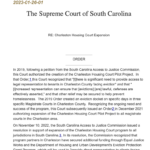 New Housing Court models have emerged out of Charleston, South Carolina, where stakeholders have created a program hosted in the court to get more access to legal representation to eligible tenants, to help them avoid evictions.
New Housing Court models have emerged out of Charleston, South Carolina, where stakeholders have created a program hosted in the court to get more access to legal representation to eligible tenants, to help them avoid evictions. - Online Dispute Resolution for landlord-tenant court in Delaware
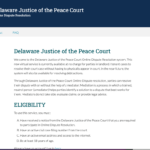 Delaware Justice of the Peace court may be the first in the nation to launch an online platform for landlords & tenants to resolve their case without going to court in person. This Landlord-Tenant ODR system is built by Matterhorn (a Court Innovations company). The ODR system allows for online mediation. In some cases it might be required by the judge. They may order the parties to…
Delaware Justice of the Peace court may be the first in the nation to launch an online platform for landlords & tenants to resolve their case without going to court in person. This Landlord-Tenant ODR system is built by Matterhorn (a Court Innovations company). The ODR system allows for online mediation. In some cases it might be required by the judge. They may order the parties to… - Sealing Eviction Records guide from Upturn
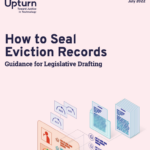 More jurisdictions are considering how to seal eviction records to protect tenants from disastrous consequences in their future housing opportunities. This guide walks through how to set up policies around this.
More jurisdictions are considering how to seal eviction records to protect tenants from disastrous consequences in their future housing opportunities. This guide walks through how to set up policies around this. - New simple lease design
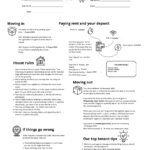 Could you transform leases into a more proactive, problem-solving tool through better information design?
Could you transform leases into a more proactive, problem-solving tool through better information design? - Tenant Power Toolkit for Californians
 LA nonprofits have created a free legal technology tool for tenants to respond to their eviction lawsuits. The Tenant Power Toolkit helps a person easily fill in the answer form & get it into the court.
LA nonprofits have created a free legal technology tool for tenants to respond to their eviction lawsuits. The Tenant Power Toolkit helps a person easily fill in the answer form & get it into the court. - Tenant Assistance Project in Nebraska
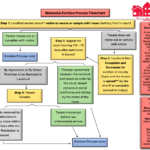 Some counties in Nebraska have started a comprehensive court-based program to connect tenants with attorneys, resources, eviction defense strategies, and procedural coaching. This can stop immediate evictions.
Some counties in Nebraska have started a comprehensive court-based program to connect tenants with attorneys, resources, eviction defense strategies, and procedural coaching. This can stop immediate evictions. - Eviction Help Flier
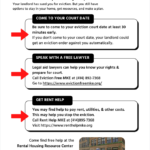 Make sure a tenant who has been sued for eviction also knows their options to get help & be prepared for court.
Make sure a tenant who has been sued for eviction also knows their options to get help & be prepared for court. - Eviction Court Summons from Montana
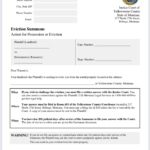 When a person is sued for eviction, how are they notified? A court summons is a crucial document to let them know about the lawsuit, help them connect with services, and get them prepared for important hearings and deadlines. This court summons was designed to be more user-friendly & accessible.
When a person is sued for eviction, how are they notified? A court summons is a crucial document to let them know about the lawsuit, help them connect with services, and get them prepared for important hearings and deadlines. This court summons was designed to be more user-friendly & accessible. - How can text messages help prevent evictions?
 By Sarah Verschoor, originally published on Legal Design & Innovation During many evictions, tenants & service providers face a troubling paradox. Just when a tenant is most at risk of eviction — and most in need of legal, financial, and housing services — this is when it is most difficult for service-providers to engage with them. When people are behind on their rent or worried about their…
By Sarah Verschoor, originally published on Legal Design & Innovation During many evictions, tenants & service providers face a troubling paradox. Just when a tenant is most at risk of eviction — and most in need of legal, financial, and housing services — this is when it is most difficult for service-providers to engage with them. When people are behind on their rent or worried about their… - Eviction Notice design from Las Vegas
 How can courts and legal actors warn a tenant about a possible eviction –so that they take action, connect with services, and avoid a forcible move? This new warning notice from Las Vegas is one example of a strategic, simplified design.
How can courts and legal actors warn a tenant about a possible eviction –so that they take action, connect with services, and avoid a forcible move? This new warning notice from Las Vegas is one example of a strategic, simplified design. - Housing Court Service Design in Indiana
 Samira Nazem at National Center for State Court highlighted some innovations at local courts in Lawrence Township, Indiana in Marion County. They have worked to create more visual, supportive guides throughout the in-person court process for tenants and landlords looking for help. These DIY efforts are cost-effective but impactful, because they provide user-friendly signposts and support to a person through a stressful and intimidating journey through court…
Samira Nazem at National Center for State Court highlighted some innovations at local courts in Lawrence Township, Indiana in Marion County. They have worked to create more visual, supportive guides throughout the in-person court process for tenants and landlords looking for help. These DIY efforts are cost-effective but impactful, because they provide user-friendly signposts and support to a person through a stressful and intimidating journey through court… - New lease designs from the UK’s Simplification Centre
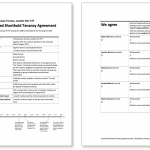 The UK design group the Simplification Centre has proposed new landlord-tenant agreement designs that can better lay out rights, responsibilities, and services.
The UK design group the Simplification Centre has proposed new landlord-tenant agreement designs that can better lay out rights, responsibilities, and services. - Emergency Rent Assistance How-To Toolkit
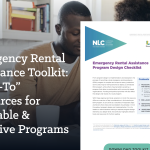 This toolkit provides a series of how-to guides to local policymakers, to make an effective and equitable Emergency Rental Assistance Program.
This toolkit provides a series of how-to guides to local policymakers, to make an effective and equitable Emergency Rental Assistance Program. - Eviction Data Tracker in the Atlanta Region
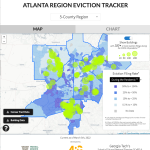 A coalition of the federal reserve, Georgia Tech, and a regional commission established a detailed eviction data tracker to understand what is happening with eviction court case filings.
A coalition of the federal reserve, Georgia Tech, and a regional commission established a detailed eviction data tracker to understand what is happening with eviction court case filings. - Ban on Evictions for Less than $600 Unpaid Rent in DC
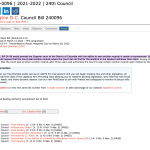 In March 2022, the Washington D.C. Council approved an act barring landlords from filing eviction lawsuits against tenants who owe less than $600 in back rent. This puts a limit on when evictions can be used for nonpayment of rent. Like ‘just cause’ or ‘good cause’ standards, it’s a policy that limits when a landlord can file for an eviction. The motivation is to prevent a modest…
In March 2022, the Washington D.C. Council approved an act barring landlords from filing eviction lawsuits against tenants who owe less than $600 in back rent. This puts a limit on when evictions can be used for nonpayment of rent. Like ‘just cause’ or ‘good cause’ standards, it’s a policy that limits when a landlord can file for an eviction. The motivation is to prevent a modest… - Transparency laws on rental decisions
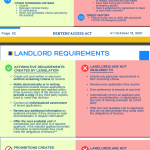 The Renter’s Access Act is a recent Philadelphia law that sets uniform guidelines about how potential landlords can screen tenant applicants, including how past evictions would affect this decision.
The Renter’s Access Act is a recent Philadelphia law that sets uniform guidelines about how potential landlords can screen tenant applicants, including how past evictions would affect this decision. - ABA Guidelines on Eviction Law
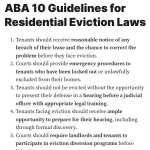 The American Bar Association has put out 10 Guidelines for Eviction Law, to guide local leaders in how to establish legal protections, due process, and diversion programs.
The American Bar Association has put out 10 Guidelines for Eviction Law, to guide local leaders in how to establish legal protections, due process, and diversion programs. - Eviction Intervention in the court house in Fort Wayne
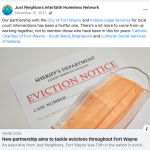 A unique partnership in the Indiana town of Fort Wayne has created an in-court eviction prevention service to reach more tenants and landlords before they go to trial, with services and guidance that can help them come to a resolution and get financial help without going to court.
A unique partnership in the Indiana town of Fort Wayne has created an in-court eviction prevention service to reach more tenants and landlords before they go to trial, with services and guidance that can help them come to a resolution and get financial help without going to court. - Texting tenants immediately after lawsuit is filed
 Courts, legal aid groups, and diversion programs are using text messages to send reminders, referrals, and encouragement to tenants to participate in court and avoid eviction
Courts, legal aid groups, and diversion programs are using text messages to send reminders, referrals, and encouragement to tenants to participate in court and avoid eviction - Social Work Navigators at eviction court in Ohio
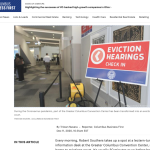 Social worker navigators are a new way to connect tenants and landlords with important assistance to resolve their problems when they visit court. They can also help court leaders make smarter referrals to get to better outcomes.
Social worker navigators are a new way to connect tenants and landlords with important assistance to resolve their problems when they visit court. They can also help court leaders make smarter referrals to get to better outcomes. - Qualified Tenant Advocates to represent tenants in courts
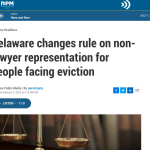 The Delaware Supreme Court established a new policy that allows non-lawyers — in this case, approved Qualified Tenant Advocates — to represent tenants in eviction court. This is only for residential tenants (not commercial ones). Usually, only licensed lawyers are allowed to represent tenants in the Delaware eviction courts, called Justice of the Peace Court. Landlords could be permitted to be represented by licensed advocates (non-lawyers) as…
The Delaware Supreme Court established a new policy that allows non-lawyers — in this case, approved Qualified Tenant Advocates — to represent tenants in eviction court. This is only for residential tenants (not commercial ones). Usually, only licensed lawyers are allowed to represent tenants in the Delaware eviction courts, called Justice of the Peace Court. Landlords could be permitted to be represented by licensed advocates (non-lawyers) as… - Eviction Mediation Program in Nevada
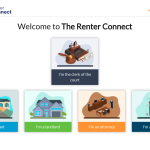 The Nevada State Bar has established an Eviction Mediation Program to get more free mediators available to landlords and tenants who are facing problems. The program provides extensive training, resources, and support to volunteers working to resolve people’s cases.
The Nevada State Bar has established an Eviction Mediation Program to get more free mediators available to landlords and tenants who are facing problems. The program provides extensive training, resources, and support to volunteers working to resolve people’s cases. - Data tracking evictions in Milwaukee
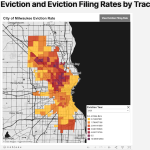 The Track Milwaukee Evictions website has gathered data about local eviction filings, court outcomes, neighborhood risk, and housing code violations. They present the data fields & visualizations to show how the eviction system works locally — and who is most at risk.
The Track Milwaukee Evictions website has gathered data about local eviction filings, court outcomes, neighborhood risk, and housing code violations. They present the data fields & visualizations to show how the eviction system works locally — and who is most at risk. - Eviction Court Watch in Texas
 Texas groups have set up an eviction Court Watch program, to track how eviction laws are actually being carried out on the ground.
Texas groups have set up an eviction Court Watch program, to track how eviction laws are actually being carried out on the ground. - Rental Registry in Portland
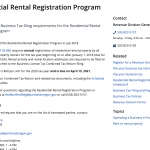 The city of Portland, Oregon has a rental registry that tracks where rental homes are, that collects $60 fees from landlords, and that maps out strategic data to improve government services and legal protections.
The city of Portland, Oregon has a rental registry that tracks where rental homes are, that collects $60 fees from landlords, and that maps out strategic data to improve government services and legal protections. - Pay-to-Stay Ordinances in Ohio cities
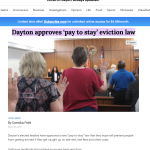 Ohio cities like Toledo, Dayton, and Cincinnati have passed new laws to give tenants a new affirmative defense if they are sued for eviction. This new protection is often called Pay to Stay, because it lets tenants pay back the rent and fees they owe to their landlord in order to stay in their home.
Ohio cities like Toledo, Dayton, and Cincinnati have passed new laws to give tenants a new affirmative defense if they are sued for eviction. This new protection is often called Pay to Stay, because it lets tenants pay back the rent and fees they owe to their landlord in order to stay in their home. - ERAP smart digital system in Philadelphia
 In Philadelphia, the housing team has used federal funds to build a smarter, more flexible technical system to improve their ERAP applications.
In Philadelphia, the housing team has used federal funds to build a smarter, more flexible technical system to improve their ERAP applications. - Online court mediation & services in Monroe County, Indiana
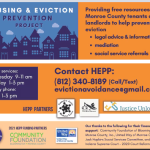 The Housing & Eviction Prevention Project (HEPP) in Indiana provides free legal, mediation, and social services to court. It includes integration into the court process, so once people are facing an eviction trial, they may be linked to services that can help them resolve their problem out of court.
The Housing & Eviction Prevention Project (HEPP) in Indiana provides free legal, mediation, and social services to court. It includes integration into the court process, so once people are facing an eviction trial, they may be linked to services that can help them resolve their problem out of court. - Michigan eviction court procedure reforms
 The Michigan state courts have created new court rules that help to slow down eviction cases, direct more landlords and tenants to rent assistance, and encourage the court to help the parties to resolve their dispute without going to trial.
The Michigan state courts have created new court rules that help to slow down eviction cases, direct more landlords and tenants to rent assistance, and encourage the court to help the parties to resolve their dispute without going to trial. - Gold Star Landlord Program in Tulsa
 The city of Tulsa has begun a Gold Star Landlord program to incentivize landlords engage in best practices for housing and addressing the eviction crisis. It gives them publicity, approved tenants, and assistance from the city.
The city of Tulsa has begun a Gold Star Landlord program to incentivize landlords engage in best practices for housing and addressing the eviction crisis. It gives them publicity, approved tenants, and assistance from the city. - Eviction Legal Helpline in Virginia
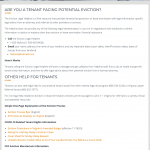 The Eviction Legal Helpline provides Virginian tenants with advice, information, and referrals. It works via phone and emails.
The Eviction Legal Helpline provides Virginian tenants with advice, information, and referrals. It works via phone and emails. - RePresent tenant education games in Connecticut & Maine
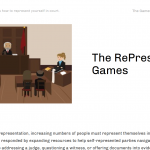 RePresent: Renter is a mobile phone game that users can download and play in order to learn how to defend themselves against an eviction. It is currently available in Connecticut and Maine.
RePresent: Renter is a mobile phone game that users can download and play in order to learn how to defend themselves against an eviction. It is currently available in Connecticut and Maine. - Website connecting tenants with free attorneys in NYC
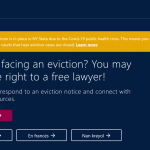 The Eviction Free NYC website helps connect people with free legal help. Any tenant in NYC who is facing eviction can go to the website to determine if they are eligible for Right to Counsel and learn how they can access a free attorney.
The Eviction Free NYC website helps connect people with free legal help. Any tenant in NYC who is facing eviction can go to the website to determine if they are eligible for Right to Counsel and learn how they can access a free attorney. - NAACP eviction navigators & diversion program in South Carolina
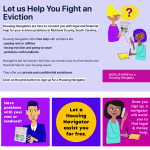 This new South Carolina pilot from the NAACP and other local partners combines various prevention and help services for tenants and landlords at risk of eviction.
This new South Carolina pilot from the NAACP and other local partners combines various prevention and help services for tenants and landlords at risk of eviction. - Orange County, Florida eviction diversion program
 In an effort to help curb evictions due to the COVID-19 pandemic, the Orange County Board of County Commissioners created the Orange County COVID-19 Eviction Diversion Program. The $13.3 million program is funded by the Federal CARES Act monies.
In an effort to help curb evictions due to the COVID-19 pandemic, the Orange County Board of County Commissioners created the Orange County COVID-19 Eviction Diversion Program. The $13.3 million program is funded by the Federal CARES Act monies. - NYC Housing Court Navigators
 The New York City Housing Courts has a navigator program to support and assist unrepresented litigants – people who do not have an attorney – during their court appearances in landlord-tenant and consumer debt cases.
The New York City Housing Courts has a navigator program to support and assist unrepresented litigants – people who do not have an attorney – during their court appearances in landlord-tenant and consumer debt cases. - COVID-19 Eviction Forms
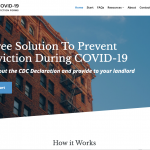 How can a person get protected under the national eviction moratorium during COVID-19? They need to fill in a Declaration document, as well as making sure they fit the requirements the CDC has laid out. This online tool, COVID-19 Eviction Forms, leads people through this Declaration drafting.
How can a person get protected under the national eviction moratorium during COVID-19? They need to fill in a Declaration document, as well as making sure they fit the requirements the CDC has laid out. This online tool, COVID-19 Eviction Forms, leads people through this Declaration drafting. - Eviction Diversion Program in Pinellas County, Florida
 Renters and landlords in Pinellas County, Florida are eligible for a COVID-19 Eviction Diversion Program to help them reach a mutual agreement, pay back-rent, get help with stable housing and financial assistance, and navigate social services. It is run by the Community Law Program in the county.
Renters and landlords in Pinellas County, Florida are eligible for a COVID-19 Eviction Diversion Program to help them reach a mutual agreement, pay back-rent, get help with stable housing and financial assistance, and navigate social services. It is run by the Community Law Program in the county. - Texas statewide Eviction Diversion Program
 The new Texas statewide eviction diversion program offers help during COVID-19 to renters and landlords. It applies once a lawsuit has been filed, and tenants are behind on rent.
The new Texas statewide eviction diversion program offers help during COVID-19 to renters and landlords. It applies once a lawsuit has been filed, and tenants are behind on rent. - PHL Eviction Diversion Program in Philadelphia
 The Philadelphia City Council has created an Eviction Diversion Program to help them mediate to a solution during COVID-19 hardships. It is to avoid court processes and eviction judgments.
The Philadelphia City Council has created an Eviction Diversion Program to help them mediate to a solution during COVID-19 hardships. It is to avoid court processes and eviction judgments. - CDC National Eviction Moratorium
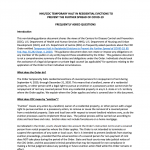 The CDC Eviction Moratorium is a new national emergency policy, that orders that renters should be protected from eviction if they are unable to pay their rent due to hardships like job loss, income loss, or medical expenses. This protection lasts from September 4, 2020 through December 31, 2020.
The CDC Eviction Moratorium is a new national emergency policy, that orders that renters should be protected from eviction if they are unable to pay their rent due to hardships like job loss, income loss, or medical expenses. This protection lasts from September 4, 2020 through December 31, 2020. - The CARES Act & Public Housing Authority renter policies during COVID
 Since the passage of the CARES Act on March 27th, 2020, Public Housing Authorities have been working to implement guidance from HUD in order to prevent evictions from subsidized housing for nonpayment of rent due to COVID-19.
Since the passage of the CARES Act on March 27th, 2020, Public Housing Authorities have been working to implement guidance from HUD in order to prevent evictions from subsidized housing for nonpayment of rent due to COVID-19. - Eviction Diversion Program in Ingham County, MI
 The court in Ingham County, Michigan has an Eviction Diversion Program to try to resolve eviction lawsuits and keep tenants housed.
The court in Ingham County, Michigan has an Eviction Diversion Program to try to resolve eviction lawsuits and keep tenants housed. - Eviction Legal Help FAQ site for COVID-19 renters’ rights
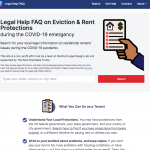 The national eviction help and renters’ rights FAQ site coordinates plain-language explanations of emergency COVID-19 protections for renters. It also presents them with local legal and financial assistance they can use. Can I be evicted? What if I can’t pay my rent because of COVID? Who can help me cover my housing costs? This FAQ site is designed to get these local answers featured more prominently on search engines and elsewhere online.
The national eviction help and renters’ rights FAQ site coordinates plain-language explanations of emergency COVID-19 protections for renters. It also presents them with local legal and financial assistance they can use. Can I be evicted? What if I can’t pay my rent because of COVID? Who can help me cover my housing costs? This FAQ site is designed to get these local answers featured more prominently on search engines and elsewhere online. - Pittsburgh’s Eviction Diversion through Mediation Program
 The city of Pittsburgh is launching an Eviction Diversion through Mediation program. This program offers free mediation services for landlords and tenants prior to filing for an eviction. It provides the same services for cases that have been filed but have not yet been granted a judgment.
The city of Pittsburgh is launching an Eviction Diversion through Mediation program. This program offers free mediation services for landlords and tenants prior to filing for an eviction. It provides the same services for cases that have been filed but have not yet been granted a judgment. - Eviction Diversion Program in Jackson County, MI
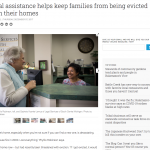 Jackson County, Michigan has an Eviction Diversion Program that lets tenants opt into the program, have mediation, legal services, and emergency assistance if they qualify. The goal is to help deal with underlying issues in the landlord-tenant relationship, and the holistic set of problems the tenant is dealing with.
Jackson County, Michigan has an Eviction Diversion Program that lets tenants opt into the program, have mediation, legal services, and emergency assistance if they qualify. The goal is to help deal with underlying issues in the landlord-tenant relationship, and the holistic set of problems the tenant is dealing with. - Eviction Moratorium policies to protect tenants during COVID-19
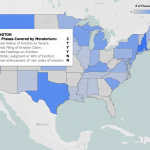 During the COVID-19 emergency, many governments have created new Eviction Moratorium policies that give special protections to tenants who might not be able to pay their rent, or who are at risk of displacement during the emergency.
During the COVID-19 emergency, many governments have created new Eviction Moratorium policies that give special protections to tenants who might not be able to pay their rent, or who are at risk of displacement during the emergency. - Letter Writer with Local Law for Tenants during COVID-19
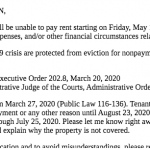 A national letter-writing tool for tenants, that integrates local law — during the COVID-19 pandemic. Tenants can use the tool to write a letter that protects their rights and documents their issues — and also send the letter to the landlord.
A national letter-writing tool for tenants, that integrates local law — during the COVID-19 pandemic. Tenants can use the tool to write a letter that protects their rights and documents their issues — and also send the letter to the landlord. - Rent Court Mediation in Maryland
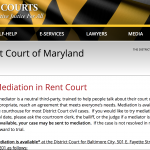 Baltimore Rent Court offers an in-court Mediation program for landlord-tenant issues. They provide a free 3rd party neutral to help the parties come to a settlement and avoid going to trial.
Baltimore Rent Court offers an in-court Mediation program for landlord-tenant issues. They provide a free 3rd party neutral to help the parties come to a settlement and avoid going to trial. - Letter-writer for COVID-19 emergency in LA
 A letter-writing tool to generate an official notice that a tenant can’t pay rent due to the COVID-19 pandemic, to ensure the landlord is given proper notice.
A letter-writing tool to generate an official notice that a tenant can’t pay rent due to the COVID-19 pandemic, to ensure the landlord is given proper notice. - Eviction Cost Calculator
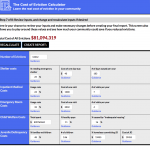 The I4J Lab at University of Arizona has created a Cost of Eviction Calculator. This tool can help policy-makers, service-providers, and others to determine what the financial cost of an eviction is to their community.
The I4J Lab at University of Arizona has created a Cost of Eviction Calculator. This tool can help policy-makers, service-providers, and others to determine what the financial cost of an eviction is to their community. - One-Stop Eviction Diversion Clinics at Housing Court & Neighborhood Centers in Minnesota
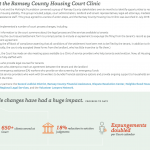 The Housing Court Clinic offers a suite of legal, dispute resolution, and financial help to tenants, as well as streamlined court process to help prevent evictions. The clinic has expanded to a Pre-Eviction neighborhood Crisis Clinic, to get the same co-located, holistic resources to tenants at a preventative stage.
The Housing Court Clinic offers a suite of legal, dispute resolution, and financial help to tenants, as well as streamlined court process to help prevent evictions. The clinic has expanded to a Pre-Eviction neighborhood Crisis Clinic, to get the same co-located, holistic resources to tenants at a preventative stage. - Right to Counsel in NYC
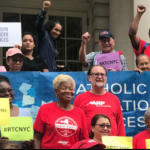 NYC’s Right to Counsel program provides free full-representation lawyers to tenants who live in eligible zip codes, and who are income-eligible. It is run by the city government’s Office of Civil Justice, in partnership with the NYC Housing Courts, local legal aid groups, and the Right to Counsel NYC Coalition.
NYC’s Right to Counsel program provides free full-representation lawyers to tenants who live in eligible zip codes, and who are income-eligible. It is run by the city government’s Office of Civil Justice, in partnership with the NYC Housing Courts, local legal aid groups, and the Right to Counsel NYC Coalition. - Tenant Education game in Boston: Fight Displacement!
 Fight Displacement is a board and trivia game that educates tenants on their rights and the different ways they can respond to the Boston housing crisis. It is intended as a training resource for community organizations working to fight housing displacement and influence local development.
Fight Displacement is a board and trivia game that educates tenants on their rights and the different ways they can respond to the Boston housing crisis. It is intended as a training resource for community organizations working to fight housing displacement and influence local development. - Eviction Data Portal in Chicago
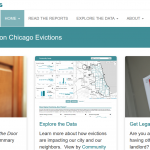 The Chicago Evictions data portal is a resource to help policy makers, community groups and others investigate Chicago’s chronic eviction problem.
The Chicago Evictions data portal is a resource to help policy makers, community groups and others investigate Chicago’s chronic eviction problem. - Tenant-Landlord Assistance Project in southern California courts
 The TLAP program in California provides legal services to qualified tenants and landlords involving unlawful detainer actions.
The TLAP program in California provides legal services to qualified tenants and landlords involving unlawful detainer actions. - Charleston Housing Court Pilot Project in South Carolina
 The Charleston County Housing Court provides legal help to low-income families facing eviction. The objective of the court is to help tenants avoid eviction through mediation with the landlord, providing help to pay rent or assessing whether the eviction was legally served.
The Charleston County Housing Court provides legal help to low-income families facing eviction. The objective of the court is to help tenants avoid eviction through mediation with the landlord, providing help to pay rent or assessing whether the eviction was legally served. - Right to Counsel Housing Jobs Board in NYC
 This job board program is for prospective tenant attorneys, to provide them with an overview of right to counsel housing jobs in NYC.
This job board program is for prospective tenant attorneys, to provide them with an overview of right to counsel housing jobs in NYC. - Housing Court Lawyer for the Day programs in Massachusetts
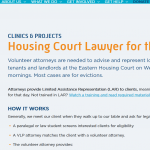 Volunteer attorneys provide Limited Assistance Representation to low-income, underrepresented tenants and landlords in housing courts in Massachusetts.
Volunteer attorneys provide Limited Assistance Representation to low-income, underrepresented tenants and landlords in housing courts in Massachusetts. - Eviction Prevention Letter-Writer, Hello Landlord
 Hello Landlord is a program developed by LawX and SixFifty to resolve rental issues before eviction takes place. The program helps tenants write a letter to their landlord if they have missed rent or need a repairs to their apartment.
Hello Landlord is a program developed by LawX and SixFifty to resolve rental issues before eviction takes place. The program helps tenants write a letter to their landlord if they have missed rent or need a repairs to their apartment. - Tenant Education in Tucson RENT Project
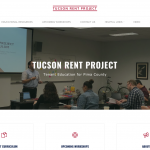 The RENT Project offers tenant education workshops in Pima County, Arizona. Volunteer attorneys and students from the University of Arizona run educational workshops on renter rights & responsibilities in partnership with local organizations throughout Pima County.
The RENT Project offers tenant education workshops in Pima County, Arizona. Volunteer attorneys and students from the University of Arizona run educational workshops on renter rights & responsibilities in partnership with local organizations throughout Pima County. - Online Legal Self-Help in Boston
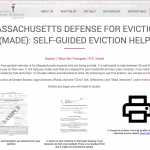 MADE is an online tool to let tenants produce eviction pleadings if they are facing a lawsuit. It helps replace a 4 hour clinic that a legal aid group runs to help tenants respond to evictions.
MADE is an online tool to let tenants produce eviction pleadings if they are facing a lawsuit. It helps replace a 4 hour clinic that a legal aid group runs to help tenants respond to evictions. - Eviction Summons Redesign in Cincinnati, OH
 A team of court officials, self-help lawyers, and university researchers redesigned the court’s official Summons that tenants receive when they are evicted, to make it more accessible and actionable.
A team of court officials, self-help lawyers, and university researchers redesigned the court’s official Summons that tenants receive when they are evicted, to make it more accessible and actionable. - Eviction Diversion Program in Durham, NC
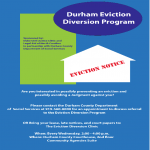 This program provides individuals facing eviction with free advice and support, ranging from emergency financial aid to legal council, with the goal of helping citizens avoid eviction judgements and decreasing the number of eviction filings and verdicts in Durham County.
This program provides individuals facing eviction with free advice and support, ranging from emergency financial aid to legal council, with the goal of helping citizens avoid eviction judgements and decreasing the number of eviction filings and verdicts in Durham County. - Eviction Prevention in Syracuse, NY
 The City of Syracuse Department of Neighborhood and Business Development invested in two eviction prevention programs focusing on early intervention services for tenants.
The City of Syracuse Department of Neighborhood and Business Development invested in two eviction prevention programs focusing on early intervention services for tenants. - Eviction Diversion Program in Richmond, VA
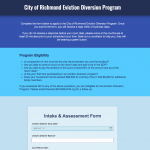 The Eviction Diversion program provides tenants who have received an unlawful detainer (and satisfy other eligibility criteria) with the opportunity (if their landlord agrees) to enter a voluntary conciliation procedure and to receive financial literacy education and financial assistance, as opposed to going through the court eviction process.
The Eviction Diversion program provides tenants who have received an unlawful detainer (and satisfy other eligibility criteria) with the opportunity (if their landlord agrees) to enter a voluntary conciliation procedure and to receive financial literacy education and financial assistance, as opposed to going through the court eviction process.
